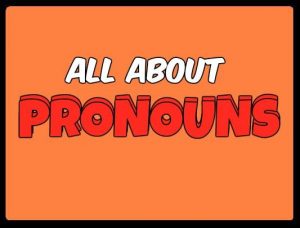What You Need To Know About Pronouns

The English language can be difficult and confusing since it has so many grammar rules to learn and understand. It also has many words which function differently or can change a sentence. When we refer to these words, they are called parts of speech. There are eight of them altogether. They are nouns, pronouns, verbs, adverbs, prepositions, interjections and conjunctions. Covering all of them in one lesson would be very difficult since the lessons require so much to go over. For the purpose of consolidating this guide, we will focus on pronouns. But what are pronouns or types of pronouns? There is also the question of what are possessive pronouns or examples? In this guide, here is what you need to know about pronouns.
What Are Pronouns All About?
In the dictionary, the definition of a pronoun is a word that can function by itself as noun phrase. It also refers to someone or something mentioned in the discussion (he, she, it, this). And refers to participants in the discourse as well (I,you, we, ours). The best and easiest way to explain it is that pronouns make things simple since they replace nouns. Without pronouns, we would have to continually keep repeating every noun we use in a speech or a sentence. The end results would be our sentences being repetitive and burdensome. That’s why pronouns are ordinarily short words. While the majority of people think of words such as he, she, I and they when talking about pronouns, that’s not always the case. The truth is that there are various different types of pronouns altogether.
Here are Six Important Grammar Rules You Need To Know
The types of pronouns are as follows:
Personal pronouns – examples – he, they
Possessive pronouns – examples – his, your
Reciprocal pronouns – examples -each other, one another
Interrogative pronouns – examples – which, who
Indefinite pronouns – examples – none, several
Demonstrative pronouns – examples – this, these
Intensive pronouns – examples – itself, himself
Relative pronouns – examples – which, where
Reflexive pronouns – examples – itself, himself
Examples Of Pronouns Usage
Since we have already mentioned that pronouns replace a noun, there are a few examples to show you. Keep in mind that pronouns should only be used in certain scenarios. For one, if you have already mentioned the name of a person in sentence, or a group of people. Or if you have already mentioned a thing(s) or place(s). If you don’t make it clear exactly which thing the pronoun you are using is modifying, you can end up confusing your reader.
Examples:
Angela Diaz loves to shop for shoes every weekend. (Angela = noun)
She is addicted to shopping. (She = pronoun)
In the sentence, the pronoun (she) took the place of the noun (Angela Diaz).
To make it even easier, we can use both the noun and pronoun in the same sentence.
Angela Diaz not only loves to shop for shoes, but she is also addicted to it.
As you can see, without the pronouns replacing the nouns, our sentence would be very confusing and too long.
Angela Diaz not only loves to shop for shoes, but Angela Diaz is also addicted to it.
The sentence proves just how important pronouns are when we are communicating.
More examples on pronouns are below –
Frank took the car to the mechanic three times last week. He is getting frustrated with the results.
(He is a pronoun and replaces Frank)
The NYC Marathon is very long and covers Manhattan, Brooklyn and 3 other boroughs. It is very hard since runners have 28 miles to run.
(It is a pronoun and replaces NYC Marathon)
Be sure to tell the team of lawyers that they need to be there early.
(They is a pronoun and replaces team of lawyers)
You may also want to read about Irregular Verbs – The Past Tense Of Catch/Caught, Bring/Brought…
As you can see from the examples above, pronouns are very important in making our conversations and sentences easier. Without them, we would have to repeat the same nouns, noun phrase or even pronouns continually. Just remember that pronouns replace a noun when applicable. But also keep in mind that a pronoun can also replace a noun phrase or another pronoun as well.
